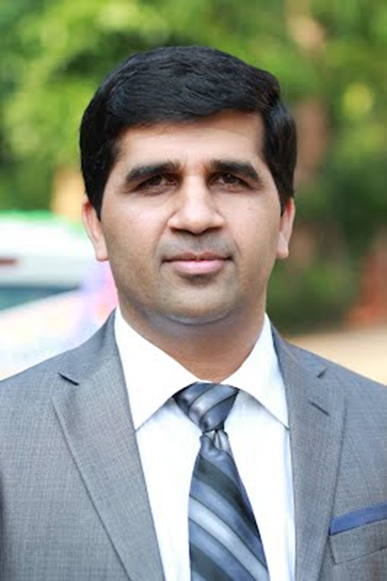
MURALIDHAR L. HEGDE, PhD
ABAP Fellow, Vebleo Fellow
Everett E. Randee K. Bernal Centennial Endowed Director of DNA Repair
Professor, Department of Neurosurgery
Director, Division of DNA Repair Research
Center for Neuroregeneration
Houston Methodist Research Institute
6670 Bertner Ave, RI-11-112
Houston, Texas 77030, USA
713-441-7456 (O) I 409-457-7079 (C)
Affiliate Faculty Member of Neurosciences, Weill Medical College of Cornell University, New York
Adjunct Faculty, Texas A & M University, College Station, Texas.
Deputy Chief Editor, Springer Journal ‘Metabolic Brain Disease’
Associate Editor, J Alzheimer’s Disease
Section Editor, International Journal of Molecular Sciences (IJMS)
Email: mlhegde@houstonmethodist.org
Publications: https://pubmed.ncbi.nlm.nih.gov/?term=hegde+ml&sort=date
Biography: As a full member and professor of the Department of Neurosurgery and Director of the Division of DNA Repair Research within the Center for Neuroregeneration at Houston Methodist Research Institute (HMRI), an affiliate Research Center of Cornell University, Dr. Hegde directs a research program focused on delineating the molecular insights into the involvement of genome damage/repair responses in human brain pathologies and developing novel mechanism-based treatment strategies for these diseases via neurorestoration/regeneration. Dr. Hegde earned his Ph.D. in Biochemistry and Neurosciences from the University of Mysore, India in 2006. He performed his graduate research at the Max-Planck Institute of Biophysical Chemistry, Gottingen, Germany as a DST-DAAD visiting fellow and at the Indian Institute of Science, Bangalore, India. He was an Assistant Professor at the University of Texas Medical Branch at Galveston, Texas before joining HMRI in 2013. Recent studies from the Hegde laboratory (Wang et al, Nature Communications, 2018; Mitra et al, PNAS, 2019; Guerrero et al, Hum Mol Gent, 2020; Dharmalingam et al, ACS Nano, 2020) have uncovered novel mechanisms of DNA repair defects in patients suffering from the motor neuron disease amyotrophic lateral sclerosis as well as brain hemorrhage, paving the ways for DNA repair-targeted therapies to prevent or slow down disease progression. The Hegde laboratory utilizes state-of-the art molecular biology/CRISPR/Cas9 mediated gene editing technologies and human induced pluripotent cell derived neuronal models, as well relevant mice models to test the hypothesis that an imbalance in genome damage and repair caused by the cumulative effect of neurodegenerative etiologies significantly contributes to these neurological disorders via senescence, ferroptosis, neuroinflammation and cell death and these are amenable to DNA repair targeted therapy. Dr. Hegde’s research has been continuously funded by multiple grants from the National Institutes of Health (NIH) and other foundations. Dr. Hegde has published over 95 peer-reviewed publications as well as ten book chapters and fundamental review articles. He has served on several grant review boards (e.g., USA Alzheimer’s Association and French Scientific Grants) in addition to study sections for the NIH and Department of Defense. Finally, Dr. Hegde is a Deputy Chief Editor for Metabolic Brain Disease and an Associate Editor for the Journal of Alzheimer’s Disease, and he also serves on editorial boards for half-a-dozen journals.
Peer-Reviewed Publications: Dr. Hegde has published more than 95 peer-reviewed publications and three patents to-date, including in several high impact journals like Nature Communications, PNAS (4), J Biol Chem (10), ACS Nano, Cell reports, Progress in Neurobiology (4), PLOS Genetics, Cell Research etc. Dr. Hegde is the senior or corresponding author on >50 of these publications, which have received excellent citations and recognitions (Total citations:>4000 and h-index 36). Thirty-five publications have come since his last promotion to Associate Professor in 2016. Two recently published articles from the Hegde lab in Nature Communication and PNAS identified a new molecular mechanism of genome instability in motor neuron disease and stroke and have been highlighted in various national and international media. Dr. Hegde served as editor on an open access book on ‘Amyotrophic Lateral Sclerosis: Advances and Challenges’, in June 2020 for IntechOpen Publishers. He also served as guest editor for special issues for the journals Mechanism of Aging and Development (2017), Journal of Alzheimer’s Disease (2016), and International Journal of Molecular Sciences (2020).
Scholarly Activities, Awards and External Recognitions: Dr. Hegde has several national and international recognitions and professional achievements to his credit. These include serving as a grant reviewer for several NIH study sections (e.g., NOMD [2016, 2019, 2020], CDIN [2020, 2021], and MDCN [2021]), as well as DOD-CDMRP AD, PD and ALS panels (2017, 2018, 2019, 2020, 2021) and other international funding agencies like Alzheimer’s Association, Motor Neuron Disease Association, UK, Netherlands Organization for Scientific Research, French Scientific Grants (FMRM), Czech Research Foundation, Welcome Trust, UK etc. Dr. Hegde serves as a Deputy Chief Editor for the Springer Journal Metabolic Brain Disease (2015-), Associate Editor for the Journal of Alzheimer’s Diseases (2011-), Section Editor for the International Journal of Molecular Sciences and editorial board member for half-a-dozen other journals. He also routinely reviews manuscripts for more than 50 journals including PNAS, JBC, NAR, PLOS, etc. Dr. Hegde has organized conference/symposia within larger conferences and served as symposia chair. He has received several international awards and recognitions, including, Fellow of Vebleo (2021), Fellow of ABAP (2018), Career Cornerstone Award, Houston Methodist Academy (2015-2020), Emerging Scientist Award, EMGS (2015), ABAP Senior Scientist Award and Gold Medal (2019), Innovative Young Scientist Award, INDICASAT (2015), International Young Scientist travel award (ATW2012), and several Conference travel awards.
Mentoring/Teaching: Dr. Hegde has a strong passion and commitment towards graduate and postdoctoral training. He has mentored a dozen graduate students/postdoctoral fellows since 2012. Two students from the Hegde lab successfully completed their dissertation research with multiple publications and graduated with their PhDs in 2019. Dr. Hegde has also served as a co-mentor for two MD/PhD students and another three graduate students. He has been recognized as a PhD research guide by Nagarjuna University, India and INDICASAT, Panama (2012‐) and by Texas A&M University, USA (2017).
